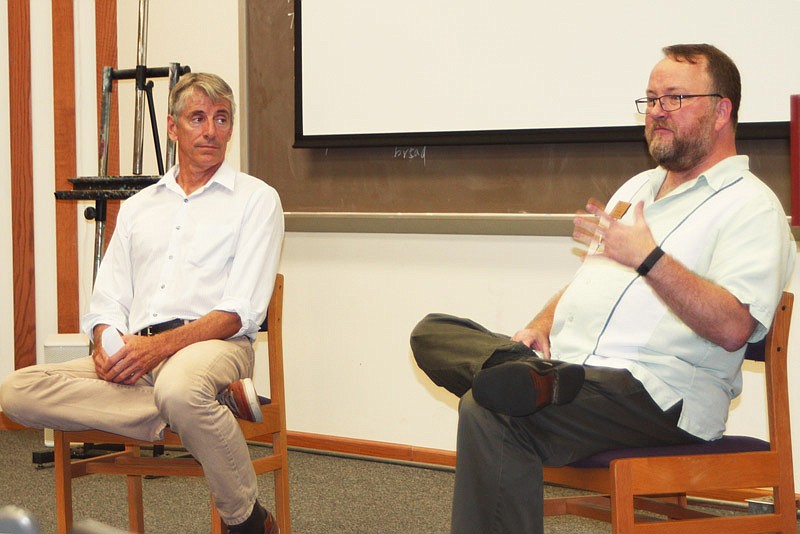Speaking from personal experience, One Read panelists Dean Andersen and Scott Miniea hosted an intimate discussion about the history of the LGBT movement and the AIDS crisis in Central Missouri.
"During (the late '80s), I knew 38 people in Central Missouri who died of AIDS," Miniea said at the Thursday evening event.
Both speakers are longtime activists and members of the gay community.
Miniea is a social media strategist at William Woods University, where the panel was held. Back in the day, he and his then-partner ran a gay bar in Columbia.
"The gay bars are still, for many, the center of the gay community," he said.
About 10 years ago, he helped found the nonprofit "Trail for a Cure," which raises funds for HIV/AIDS research. He currently serves on the organization's board.
Andersen is a health educator at the University of Missouri and an activist who also has experience as a grant manager. He's been involved with Out, Proud and Healthy, which helps provide awareness and resources to address the health disparities between LGBT individuals and the rest of Missouri's population.
Andersen talked about how he can relate to the author of the book "Bettyville," One Read 2016's selection. George Hodgman, a gay man, lived in Paris, Missouri, as a child and eventually moved back from New York City to care for his aging mother there.
"I grew up in a town of about 350 people," Andersen said.
His mother also had cancer; it was during her years spent fighting it that he came out to her.
"She cried every time she talked to me for a year," he said. "She said I had to fight it like she was fighting cancer."
He didn't meet an openly gay person until he was at college in MU. One of his acquaintances came out and hung himself shortly afterwards, after learning he had AIDS.
Andersen knew he had to do something to help protect people like that man, so he started providing condoms in his dorm.
"We were probably the first dorm in Missouri that gave out condoms," he said, adding this was in the early '80s.
Miniea spoke about the fear and hopelessness many gay people felt.
"Back in those days, it was terrifying even to go and get tested," he said.
A diagnosis was a death sentence, and it meant being outed to your family and friends as the health department would notify those you had been in contact with. Those friends and family members were ikely to ostracize you in return.
"People took risks like unsafe sex because they wanted to feel accepted," Andersen said.
He started a group to educate MU students about HIV risk factors and how to protect themselves.
"While we were receiving money from the state, we couldn't even talk about condoms," he said.
Being gay, much less being an advocate for the gay community, was a far more dangerous business back then than it is today. But for many, advocacy was already a matter of life and death.
"Our community ultimately learned how to organize and get attention - because our friends were dropping dead," Miniea said.
Someone smeared feces on Anderson's door and poured sugar in his motorcycle's oil tank. At one town hall meeting he attended in Fulton, when Missouri was considering introducing a constitutional amendment regarding the legality of discrimination based on sexual orientation, people scooted away from him like he might be infectious, he said.
Miniea was an elementary school teacher in the '90s, and he knew if he were open about his sexual orientation, it would cost him his job. In fact, part of what drew him to William Woods was the employment protection they promised LGBT staff and faculty members.
"I never even thought about gay marriage," Andersen said. "I just wondered if I could have a job without getting fired."
While Miniea and Andersen both marvelled at the progress that's been made in gaining acceptance and protection for LGBT individuals, they acknowledged that there is still work to be done.
"In Missouri, you can still be fired for being gay," Miniea said.

